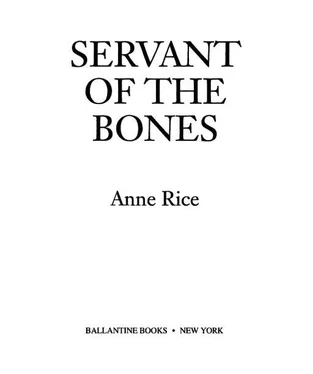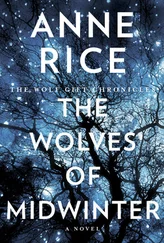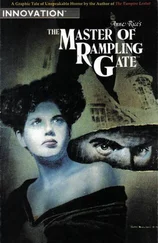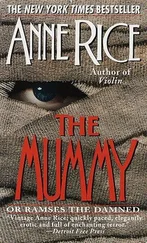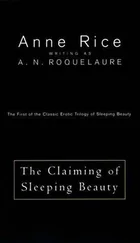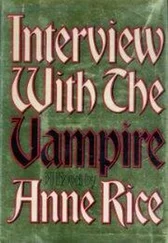But I never let go. I never really let go.
As I came to myself, as I gathered strength again, as I set my eyes upon a destination, I thought of all these various aspects of my situation—that I very well might be utterly Masterless, that I wouldn’t fail Esther, that I was stronger than I’d ever been—and I was determined to fight harder this time to be free of either of these two men—the Rebbe or his grandson Gregory—I was determined that if I could not die, I would gain life apart from them.
Who knows what nourishes a spirit, in the flesh or out of it?
Men and women in this time, who would have laughed at our old customs, believed in absolutely preposterous explanations of things—take, for example, how a hailstone comes to form, from a speck of dust in the upper atmosphere, falling, then rising, gathering ice to itself, falling again, then rising again, and becoming larger and larger, till some perfect moment is reached at which the hailstone breaks the circuit and falls to earth and then, after all of that, all of that wondrous process, melts to nothing. Dust to dust.
Someday these people—these clever minds of today—will know all about spirits. They will know as they knew about genes and neutrinos and other things they cannot see. Doctors at the bedside will see the spirit rise, the tzelem, as I saw it rise from Esther. It will not take a sorcerer to drive a spirit heavenward. There will be men clever enough to exterminate or extinguish even something like me.
Note this, Jonathan.
Scientists of your time have isolated the gene for a fruit fly that is eyeless. And when they take his genes and inject them into other fruit flies—God have mercy on his tiny creatures—do you know that these fruit flies produce eyes all over their bodies? Eyes on their elbows? And on their wings?
Doesn’t that make you love scientists? Don’t you feel tenderness towards them and respect for them?
Believe you me, coming back to myself the following night, taking form again, diaphanous but optimistic and hatefully calm, I did not think to seek the help of scientists any more than sorcerers to effect my final death. No. I was done with all practitioners of the unseen; I was done with everything except justice for a girl I’d never known. And I would find a way to die, even if it meant I had to remember everything, every painful moment of what I’d suffered when death should have come to me, when death should have been granted, when the Ladder to Heaven might have fallen down, or at least the Gates of Hell swung wide.
Stay alive long enough to understand!
It was exciting! It was perhaps the only truly exciting thing that I could at that moment imagine or recall.
On the sidewalk, the next night, in Brooklyn, I took form whole and swift as if some modern man had flicked a light switch. Invisible to mortal eyes, but in the very shape that would soon enough become solid.
I wanted it this way. But still, to come forth on my own? I couldn’t quite trust it. But tonight I would make strides in my search for the truth.
Brooklyn again, the house of the Rebbe and his family, and Gregory’s car sliding to the curb.
Invisible, I drifted close to Gregory, fairly wrapping myself around him, though never touching him really, escorting him back the alleyway, almost touching his fingers as he unlocked the gate.
When the door opened, I entered with him, beside him, buoyant and fearless, breathing in the smell of his skin, inspecting him as never before.
I think I was luxuriating for a moment in the invisibility, which in general I hate, and came close to see how very well groomed and strong this man was, and that he had the glow of a king. His black eyes were uncommonly bright in his face, unencumbered by fleshly wrinkles that suggest weariness or an attitude, and his mouth in particular was very beautiful, more beautiful than I had realized. He wore fine clothes as before, the simple garments of this era, a long coat of soft fleecy wool, fine linen beneath it, and around his neck, the same scarf.
I went to the far left corner of the room, a much better place than I had occupied the night before, this time quite far to the left of both men and the dingy lamps beside and above them, and the small circle of intimacy which they so unwillingly shared.
Indeed I could see the old man’s profile as I saw Gregory’s, the two facing each other, and the casket gleaming on the desk, the desk this time which had been stripped of all its sacred books and would no doubt be purified after by a thousand words and gestures and candles, but what was that to me?
I was making the air move. The old man would know it within seconds. I had to be still and resist the lure of my growing strength. Remain diaphanous, quick to move, rather than to be scattered, willing to pass through the wall intact, rather than frightened once more or hurt into disintegration as I had been the night before.
I was near the wall that was closest to the street outside, against a wooden door that appeared unused, its brass handle covered with dust, and I could see my own shape, my folded arms, my shoes. I called the duplicates of Gregory’s clothes to form themselves easily around me, in so far as I knew the details.
The Rebbe rested on his elbows, staring at the casket before him, and the black chains looked ugly against the plated gold.
I felt nothing in me that he was so near to the bones. I felt nothing that either man spoke of them, or moved about them, or stared at the casket which held them, and this I noted.
Behave now as if you are living, and as if it matters to go on living. Be careful as the living. Take your time .
My own advice to myself amused me a little. But then I settled in, deep into the corner, beyond where the light fell, beyond where it might even touch my half-visible shoe or inevitably gleaming eye.
Old man, just try it! I was ready for him. I was ready for anyone or anything.
Gregory stepped anxiously into the light. He looked directly at the casket. The old man behaved as though Gregory were not there. Gregory might have been the spirit. The old man stated at the gold plating; he stated at the iron chains.
Gregory reached out, and without asking permission he put his hands on the casket. Then I did feel a shimmer, much as I loathed it, and I was stronger, instantly stronger.
The old man stared right at Gregory’s hands. Then he sat back, sighing heavily as if for effect or punctuation, and he reached for a sheaf of papers—rather cheap and light paper, nothing as good as parchment—and he thrust this group of papers at Gregory, holding them up above the casket.
Gregory took the papers.
“What’s this?”
“Everything written on the casket,” said the old man in English. “Don’t you see the letters?” His voice was full of despair. “The words are written in three tongues. Call the first Sumerian, the second Aramaic, and the last Hebrew, though they are ancient tongues.”
“Ah! This was more than kind of you. I never expected such cooperation from you.”
I thought so too. What had moved the old man to be so helpful?
Gregory could barely hold the papers steady. He shuffled them, put them back in order, and started to speak.
“No!” said the old man. “Not here. It’s yours now and you take it. And you say the words when and where you will, but not under my roof, and from you I exact one last promise, in exchange for these documents which I have prepared for you. You know what they are, don’t you? They let you call the spirit. They tell you how.”
Gregory made a soft laugh. “Once again, your kindness overwhelms me,” he said. “I know your disinclination to touch even trifles which are not clean.”
“This is no trifle,” said the old man.
Читать дальше
